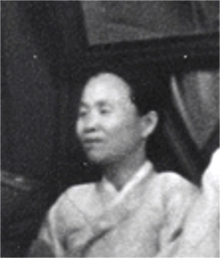Pak Chong-ae
| Pak Chong-ae | |
|---|---|
 |
|
| Minister of Agriculture | |
| Personal details | |
| Born | 1907 North Hamgyong Province, Korea |
| Died | Sometime in or after 1986 |
| Nationality | North Korean |
| Political party | Workers' Party of Korea (1949–) |
| Other political affiliations |
Workers' Party of North Korea (–1949) |
| Spouse(s) | Kim Yong-bom |
| Children | Pak Sun-hui |
| Alma mater | Moscow State University |
| Awards | International Stalin Prize (1950), Order of the National Flag (1st and 2nd class) |
| Korean name | |
| Chosŏn'gŭl | 박정애 |
| Hancha | 朴正愛 |
| Revised Romanization | Bak Jongae |
| McCune–Reischauer | Pak Chŏng'ae |
Pak Chong-ae (Korean: 박정애; born Ch'oe Vera 1907 – ?), also known as Pak Den-ai, was a North Korean politician.
Pak represented the Workers' Party of North Korea (WPNK) and after 1949 the unified Workers' Party of Korea (WPK). She was already an experienced communist at the time of the liberation of Korea, and she had also studied in the Soviet Union and worked for its intelligence service. She is grouped variously among either the Soviet or the Domestic faction of the party.
Pak was the first chairperson of the North Korean Central Committee of the Korean Democratic Women's League, the country's mass organization for women. During her chairwomanship the League had not yet developed into an organization through which the government tightly controls its citizens.
Pak is the only woman to have served in the Politburo of the Workers' Party of Korea. She has been characterized as being the only woman ever to have been truly important in the WPK. Her career in North Korean politics stretched from the 1940s until her purge in 1966 which resulted in her expulsion to countryside. From there on she was allowed to hold minor positions only.
Pak was awarded with the International Stalin Prize in 1950.
Pak was born in 1907 in North Hamgyong Province in the north of the Korean Peninsula. She went to the Soviet Union to study in the Moscow State University. She then worked for the Soviet Union as an intelligence agent before entering politics. In the early 1930s, she was dispatched to Korea for duty, where the Japanese authorities imprisoned her.
...
Wikipedia
